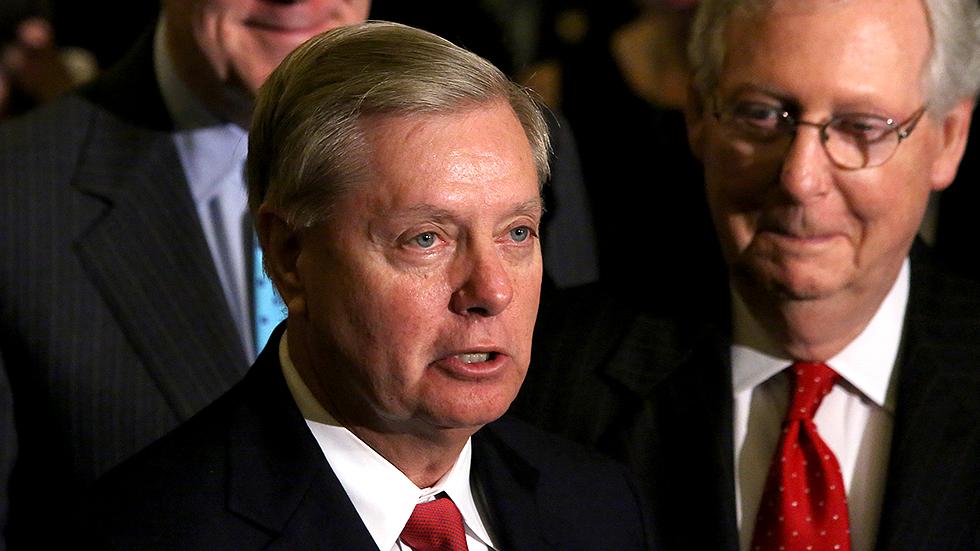GOP Split Over Coronavirus Stimulus Package
Senate Republicans are divided over how to structure the coronavirus stimulus package that looks like it may cost nearly $1 trillion, according to The Hill.
Disagreements range from whether to only hand cash to Americans who miss paychecks due to the pandemic, or distribute money to all adults in a bid to stimulate the economy.
Another point of contention is whether economic aid should be delivered through unemployment benefits should go to those whose income has been affected, or whether it should go to businesses in the form of loans or reductions in payroll tax.
Another topic under heated debate is targeted bailouts – such as the $50 billion requested to keep the airline industry afloat.
President Trump and Treasury Secretary Steven Mnuchin favor a generous economic assistance package, but GOP lawmakers are calling for loans instead of direct payments.
“Everybody’s got their own idea,” Sen. John Hoeven (R-N.D.) said after his conference met with Mnuchin and National Economic Council Director Larry Kudlow. “Everybody wants to make sure we get the help out to people that need it. There are different ideas on how best to do it.”
In a sign of the difficulties to come, the Senate as of Tuesday evening could not agree on how to proceed to a vote on a much simpler $104 billion coronavirus relief bill already approved by the House. The $1 trillion package will be a tougher battle. –The Hill
The Senate, which Majority Leader Mitch McConnell (R-KY) has pledged won’t leave town until it passes the bill, may delay the bill into next week or longer to hammer out the massive stimulus package.
As we reported last week, Sens. Mitt Romney (R-UT) and Tom Cotton (R-Ark) have advocated for direct payments to adult Americans, including those who don’t miss paychecks – as it will be stimulative to the economy.
Romney, who favors sending out $1,000 checks, says it will help families meet their short-term financial obligations and ease the burden on students entering the workforce.
Cotton has a slightly different idea. He wants the Treasury Department to cut tax-rebate checks of $1,000 for every adult tax filer making less than $100,000 per year and an extra $500 for each claimed dependent. –The Hill
Mnuchin and Kudlow proposed a $250 billion first round of direct checks, followed by another $250 billion in a second round if needed.
That said, several GOP Senators are opposed to cash handouts, with Judiciary Committee Chairman Lindsey Graham (R-SC) calling direct checks “money wasted.”
“It won’t help the economy just throwing money at a problem,” Graham told reporters following a Senate Republican lunch meeting last Tuesday, at which Mnuchin and Kudlow were present. “I don’t know why giving a thousand dollars on top of their paycheck makes any sense now because there’s no economy to participate in. I’d rather take that money and shore up health care systems,” he added.
Indiana Senator Mike Braun (R) said on Tuesday that cutting the payroll tax makes “more sense” than “cash payments or this stipend idea,” adding that he wouldn’t rule out supporting direct payments as long as they are limited to hourly workers directly affected by the pandemic.
Further debate has been had over whether to increase loans and grants to small businesses, or beef up unemployment insurance.
Braun, a former small business owner, says it’s better to beef up unemployment insurance benefits, but other Republicans are pushing for pouring hundreds of billions of dollars into direct assistance for small businesses.
Mnuchin on Tuesday proposed $250 billion in assistance for small businesses, according to Hoeven. –The Hill
Florida Senator Marco Rubio (R), who chairs the Small Business Committee has been pushing for direct assistance to small businesses.
“There’s strong conviction and belief that we’re going to have to step up, using the local banks and all the banks to participate in a program guaranteed by the [Small Business Administration] to provide immediate cash availability to businesses in order to be able to maintain workers,” he said, adding that the administration wants to utilize an existing Small Business Administration (SBA) loan program which guarantees loans to small businesses.
Sen. Susan Collins (R-Maine) is working with Rubio and Mnuchin on a plan to give cash-flow assistance to employers who agree not to pay off workers. Her program would consist of a forgivable loan contingent upon employers continuing to pay employees.
Finally, debate over how to provide assistance to major corporations and industries has been raging.
Mnuchin warned on Tuesday that airlines are in danger of grinding to a halt and said he has been in conversations “around the clock” with airline CEOs.
“We’re going big,” Trump told reporters Tuesday morning. “We don’t want airlines going out of business. We don’t want people losing their jobs and not having money to live.”
But Republican senators are warning they will not support a bailout of the airline industry similar to what happened in 2009, when President Obama’s administration pumped tens of billions of dollars into ailing banks during the financial crisis. –The Hill
“A lot of us our against a bailout,” said Senate Appropriations Committee Chairman Richard Shelby (R-AL), who would instead back business loans.
And Sen. Josh Howley (R-MO) says that any industry seeking significant economic aid should prepare to agree to concessions that would bring jobs back to the United States.
“I will say this about industries who come to us and want significant relief: For those that have significant supply chains in China, I want to see some commitments they’ll move those supply chains out of China and back to the United States,” said Howley – adding that industries under consideration for benefits should be selected on a “case-by-case basis.”
“What is the overall economic distress? What will it do for actual workers?” he added.
Tyler Durden
Wed, 03/18/2020 – 11:15
